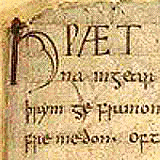 There’s nothing like a page-turner. It gets the adrenaline going. It takes me on a journey and makes me forget about a lot of things, like meals, chores, and appointments, etc.. For once, there is no lingering on a sentence or trying to make sense of what is on the page. I am suddenly a reader who understands every word I read and that makes me feel good. Furthermore, it is POETRY! How can that be possible? Poetry, a page-turner?
There’s nothing like a page-turner. It gets the adrenaline going. It takes me on a journey and makes me forget about a lot of things, like meals, chores, and appointments, etc.. For once, there is no lingering on a sentence or trying to make sense of what is on the page. I am suddenly a reader who understands every word I read and that makes me feel good. Furthermore, it is POETRY! How can that be possible? Poetry, a page-turner?
It is entirely possible when reading Seamus Heaney’s translation of the Anglo-Saxon poem, Beowulf. It is like a Dan Brown novel, action packed with the hero slaying a menacing troll, the hero slaying the troll’s mother, the hero battling with a dragon, etc.. The story unfolds, line by line, quickly and seamlessly. But is that why I read poetry?
In the original Old English text, each line has a clear pause in the middle. This text is placed side by side with Heaney’s translation so the archaic structure is apparent. Heaney mostly ignored the pause except for an occasional song or poem within the poem. He tells the story in poetic prose and indeed has created a page-turner. But the value of Beowulf is in the movement of the poem—the rhythms, and how stories were told in the 7th Century. The plot is only a story. The movement is life.

